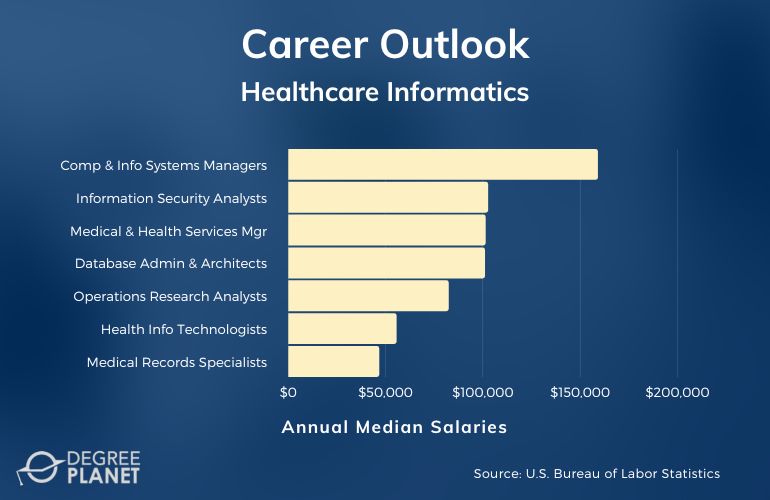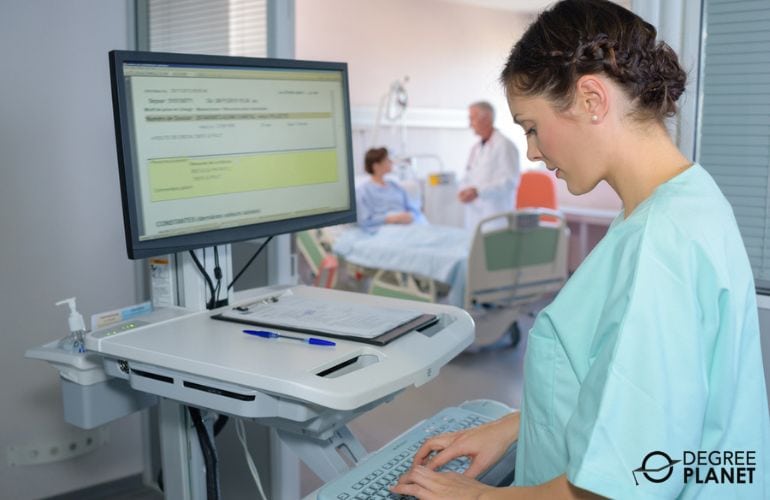If you are interested in healthcare, completing a health informatics certificate could be a strategic way to enter the field or advance your current qualifications.

Health informatics programs combine studies in healthcare with information sciences, technology, and data analysis. They can help you prepare to work in healthcare systems in a variety of roles, many of which can be professionally, personally, and financially rewarding.
Editorial Listing ShortCode:
Exploring high-quality health informatics certificate programs online may be your first step toward beginning or advancing your career in this field.
Online Health Informatics Certificate Programs

Health informatics is a blend of health science, information sciences, and computer science. In this kind of program, you can learn about how to apply these sciences to healthcare technology, which is a vital component of today’s medical facilities and practices.
Completing a health informatics online certificate is a beneficial way to prepare for careers in the healthcare system and determine whether they are a good fit. Certificate programs tend to require a lower investment of time and money than degree programs, so they can offer a prime opportunity to test your interest in the field.
During a healthcare informatics program, you will likely study subjects like:
- Databases
- Data analytics
- Human-computer interactions
- Healthcare management
- Ethics
- Medical terminology and coding
The material you’ll learn when studying these subjects can serve as a foundation for diverse career opportunities. If you have an interest in healthcare but prefer not to attend medical or nursing school, health informatics can be a strategic option. It allows you to serve patient needs without actually administering care.
Editorial Listing ShortCode:
With a graduate certificate in healthcare informatics, professionals often pursue careers in:
- Healthcare management
- Health informatics
- Clinical informatics
- Patient records
- Pharmacy informatics
- Information security
- Clinical coding
- Health data
Earning a graduate certificate in health informatics is also common for students who are considering enrolling in a health informatics master’s program. In many cases, you can apply the credits from your certificate program to the necessary coursework for an on-campus or online health information management degree at the master’s level.
Healthcare Informatics Careers and Salaries

Completing a certificate in healthcare informatics may help you qualify for a number of lucrative and growing careers. Because health informatics combines two rapidly expanding industries, healthcare and information technology, positions within the field are generally in-demand and secure. Many also pay higher than average salaries.
According to the Bureau of Labor Statistics, these are some common career paths for professionals with a background in health informatics.
| Careers | Annual Median Salaries |
| Computer and Information Systems Managers | $159,010 |
| Information Security Analysts | $102,600 |
| Medical and Health Services Managers | $101,340 |
| Database Administrators and Architects | $101,000 |
| Operations Research Analysts | $82,360 |
| Health Information Technologists and Medical Registrars | $55,560 |
| Medical Records Specialists | $46,660 |
| Information Clerks | $37,450 |
| Medical Assistants | $37,190 |
| Medical Transcriptionists | $30,100 |
In addition to paying well, several of these positions are projected to grow at an impressive rate.
Editorial Listing ShortCode:
For example, over the next ten years, medical and health services managers and information security analysts are expected to have particularly promising outlooks of 28% and 35% job growth, respectively (Bureau of Labor Statistics).
Health Care Informatics Certificate Curriculum & Courses

The specific courses that you will take in a healthcare informatics certificate program differ based on the school you choose to attend and whether the program has a specialized focus. Some common courses include:
- Introduction to Health Informatics: This course focuses on the role of data in healthcare systems, the security of medical computer networks, and the science of medical technology.
- Database Management Systems: In this class, you’ll learn how to define data needs and structures as well as how to design and implement an application with a database management system.
- Healthcare Information Architecture & Security: This course focuses on system architecture, hardware, and healthcare security standards.
- Decision Support and Electronic Health Records: You’ll learn about the applications and systems that promote decisions support in healthcare.
- Health Information Technology: This class centers on IT topics related to the healthcare industry.
- Advanced Health Informatics: In this class, you’ll build on your knowledge about data collection and information systems.
- Clinical Records: You’ll examine the role of clinical records in healthcare systems, particularly how to store and secure them electronically.
- Ethical Issues in Healthcare: In this course, you’ll learn about the ethical challenges tied to handling patient information.
- History and Evolution of the Healthcare System: This class focuses on the evolution of the healthcare system from economic, political, and social perspectives.
- Biomedical Sciences and Health IT: In this course, you’ll explore biomedicine, medical terminology, treatments, and the role of IT and health informatics in making medical decisions.
Most certificate programs will not require you to complete all of these courses in order to graduate.
Admissions Requirements

Each certificate program can have varying admissions requirements for enrollment, but these criteria often include:
- Bachelor transcripts. You will provide official undergraduate transcripts from previous universities.
- Letters of recommendation. Providing references from former instructors or employers who are familiar with your skills or character could make your application stronger.
- Personal statement. Most colleges ask for a statement that explains your goals and interests.
- Resume or CV. Highlighting relevant experience in the field is another way to demonstrate your preparedness for the program.
In addition, you might be required to show that you had a specific GPA upon graduating from your bachelor’s program.
Health Informatics Certificate Online Programs Accreditation

As you compare health informatics certificate programs, it is important to verify each prospective school’s accreditation status. In order to become accredited, universities must demonstrate that they have met standards set by a regulatory agency.
Editorial Listing ShortCode:
An accredited schools is recognized as being credible and having a high level of academic quality. Regional accreditation is often preferred, as it is considered the gold standard because of the rigorous assessment involved. In addition, courses from regionally accredited schools are more likely to be transferable.
Financial Aid and Scholarships

Graduate certificates are often more affordable than masters degree programs, but the upfront cost can still be an obstacle for many students.
In order to pursue your certificate without exceeding your budget, you can research forms of financial aid to see what’s available to you. You might choose to apply for federal aid by submitting the FAFSA. You can also explore your state’s aid programs.
In addition, you can also research scholarship opportunities, which may be specifically designed for your field or for students in your circumstances. If you’re already working in the field, tuition assistance or reimbursement programs may be available from your employer.
The amount of funds that you receive is often based on your need, and not all programs are eligible for federal or state aid. Contacting the financial aid office at the college or university you plan to attend can be helpful in determining what potential sources of funds are available.
Is Health Informatics a Good Career?

Yes, health informatics is a good career for many professionals. There are several potential career paths for graduates of health informatics programs, including database design, health data analysis, and IT management.
A lot of these careers are expected to have faster than average growth over the next ten years. For instance, the Bureau of Labor Statistics projects 17% job growth for health information techs and medical registrars. The median salary for these positions is $55,560, which is also above the average for all occupations.
Health informatics can also be a rewarding career, as you may have the chance to make contributions that improve patient care and even save lives.
What Can You Do with a Graduate Certificate in Health Informatics?

A graduate certificate in health informatics can help you prepare for various types of careers. For example, some professionals become medical records specialists, health informatics specialists, or clinical informatics analysts. Those with experience may work as medical or health services managers or information systems managers.
The career you pursue can also depend on your particular interests and goals. You might choose to seek a job where you design and maintain databases, analyze patient data, or help develop new healthcare technology. Health informatics also offers opportunities in a wide range of environments.
Some health informatics professionals find positions in pharmacies, insurance companies, hospitals, government agencies, and health clinics.
How Long Does It Take to Get an Online Certificate in Health Informatics?

In most cases, it takes 8 to 18 months to complete a health informatics graduate certificate, but this time span can change based on several factors. For example, if you are attending part-time, it may take longer to complete the program.
Editorial Listing ShortCode:
The number of credits required by the specific program you choose will also have a significant effect on the period of completion. Many programs require you to complete between 12 and 16 credit hours. In addition, some programs have an internship requirement, which could lengthen the amount of time that it takes to receive your certificate.
What’s the Difference Between a Healthcare Informatics Certificate vs. Certification?
While they sound very similar, a certification and certificate in health informatics have some critical differences.
- Awarding body. A certificate is awarded by a college or university, while a certification is awarded by a regulatory organization in the industry.
- Expiration. An academic certificate does not have an expiration date, but it’s often necessary to periodically renew most medical certifications.
- Experience requirement. Many IT healthcare certifications require applicants to have some experience in the field, but there is generally no such requirement for an academic certificate program.
You might opt to complete both a health informatics certificate and a health informatics certification online. Some graduate certificates are even designed to prepare you certification.
Is a Health Informatics Graduate Certificate Worth It?

Yes, a health informatics graduate certificate is worth it for many students. Both healthcare and information science are quickly growing fields with positive job outlooks. These services are essential, so there is often great need for health informatics professionals.
In fact, the Bureau of Labor Statistics projects that several jobs in the health informatics sector will have faster than average growth over the next ten years. These include information security analysts (35% job growth), health information technologists and medical registrars (17%), and medical assistants (16%).
Editorial Listing ShortCode:
In addition, computer and information systems managers as well as medical and health services managers are expected to see faster than average growth, too.
Universities Offering Online Graduate Certificate in Health Informatics Program
Methodology: The following school list is in alphabetical order. To be included, a college or university must be regionally accredited and offer degree programs online or in a hybrid format.

Boston University offers a Graduate Certificate in Health Informatics. This program may be a good fit for individuals pursuing careers in data science, information technology, software development, or systems analysis in healthcare. The certificate requires the completion of 16 credit hours. On average, students can complete the program’s requirements in 8 to 12 months depending on their course load.
Boston University is accredited by the New England Commission of Higher Education.

Georgia State University offers a Graduate Certificate in Health Informatics. The curriculum covers key topics in data analytics, project management, healthcare technology, and systems management. The convenient online format may make the program an ideal fit for busy working professionals. Most students can complete the certificate in just 12 months.
Georgia State University is accredited by the Southern Association of Colleges and Schools: Commission on Colleges.

Temple University offers an online program for a Graduate Certificate in Health Informatics. The curriculum covers health information technology, data standards, security and privacy regulations, and IT’s impact on business success. This certificate requires the completion of 12 credit hours. Students can complete their requirements using a part-time or full-time learning model.
Temple University is accredited by the Middle States Association of Colleges and Schools.

The University of Arizona offers a Healthcare Informatics Graduate Certificate. The curriculum consists of classes like Data Management in Healthcare Systems, Human Factor in Health Information Technology, and Healthcare Informatics Theory and Research. Students can typically complete the certificate requirements in 9 to 15 months of part-time attendance. All classes meet entirely online.
The University of Arizona is accredited by the Higher Learning Commission.

The University of Massachusetts—Lowell offers a Graduate Certificate in Health Informatics. This certificate is intended for students with healthcare backgrounds seeking training in informatics pertaining to their careers. The program is offered fully online. Credits completed in this certificate program can potentially be applied toward a future master’s degree in the discipline at this institution.
The University of Massachusetts Lowell is accredited by the New England Commission of Higher Education.

The University of Missouri offers a Health Informatics Graduate Certificate. The program aims to increase students’ expertise in technology and systems management in the health services industry. The program requires the completion of 12 credit hours. Courses cover key topics like telehealth, health data analytics, information security, healthcare ethics and law, and data warehousing.
The University of Missouri is accredited by the Higher Learning Commission.

The University of South Florida offers a Graduate Certificate in Health Informatics. This program may be an ideal fit for students pursuing information technology careers in settings such as hospitals, health insurance providers, or pharmaceutical companies. The program utilizes a 100% online learning format and requires the completion of 12 credit hours.
The University of South Florida is accredited by the Southern Association of Colleges and Schools Commission on Colleges.

The University of Tennessee—Knoxville offers a Health Informatics Graduate Certificate. The curriculum emphasizes the way people, information, and technology connect and impact health services, care providers, patients, and organizations. Courses cover topics like data mining techniques, current health information management standards, analytics processing, and security. Students can attend all classes online.
The University of Tennessee – Knoxville is accredited by the Southern Association of Colleges and Schools Commission on Colleges.

The University of West Florida offers an online program for a Graduate Certificate in Health Informatics. This program is designed for health professionals seeking career advancement or professionals holding previously completed bachelor’s degrees who desire additional education. Courses are either 8 or 16 weeks long. Most students can complete the program’s 12 required credit hours in just 12 months.
The University of West Florida is accredited by the Southern Association of Colleges and Schools Commission on Colleges.

Villanova University offers a Graduate Certificate in Health Informatics. The curriculum seeks to provide students with a comprehensive understanding of data acquisition, storage, retrieval, and analytics in the healthcare field. This program is housed 100% online. Students can potentially complete the program’s five required courses in just 1 year.
Villanova University is accredited by the Middle States Commission on Higher Education.
Getting Your Graduate Certificate in Health Informatics Online

If you want to improve clinical care, patient outcomes, or medical records security, then you might consider a career in health informatics.
Completing a health informatics certificate program online is a beneficial starting point for students who wish to pursue careers in this field. By enrolling in an accredited school, you may develop the skills and knowledge necessary to become a health informatics professional and create a path for advancement and growth in your career.
You can begin this next step in your educational journey by researching the curriculum, cost, and format of various graduate certificate programs to determine which is best for you.

